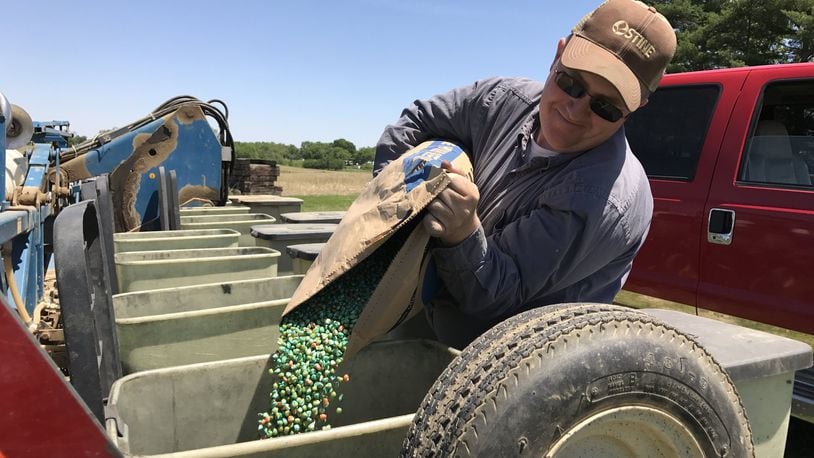and Grant Pepper
Staff Writer
The Trump administration’s hopes to revise a two-decade trade agreement with Mexico and Canada is prompting fears among some that acrimonious talks could spark a trade war that could threaten the lucrative export of soybeans and corns by Ohio’s farmers.
Although U.S. Trade Representative Robert E. Lighthizer last month assured lawmakers on Capitol Hill that the administration is committed to producing “substantive results” for American agriculture, the 1993 North American Free Trade Agreement and other trade pacts have led to a thriving Ohio farming export industry.
Many Ohio farmers depend on exports of soybeans, corn and wheat to Mexico, as well as nations outside of NAFTA such as China and Japan.
“Today Mexico is our largest corn market,” said Tadd Nicholson, executive director of Ohio Corn and Wheat Growers Association. “I could imagine a 20-year agreement could use some modernization, but to completely to open it up makes us a little nervous because agriculture has been such a beneficiary.”
Brian Harbage, who grows soybeans and corn on his farm just east of Springfield, said, “It’s all on the export side of things. Anytime that we would have a surplus of crops in the United States it’s going to push the price down. That’s going to tighten up my bottom line and make it less profitable for the commodities that I’m growing.”
Others are more optimistic. Lane Osswald, a corn and soybean farmer from the one-stop-light town of West Manchester north of Eaton, admits to some nervousness “any time a deal that is working is discussed.”
But Osswald, who sits on the Ohio Farm Bureau board and was among a group of farmers that met in Cincinnati last month with U.S. Agriculture Secretary Sonny Perdue, said “Mexico and Canada don’t want to lose us as trading partners; they’re two of our biggest customers. And I believe that if there are any changes negotiated, it will probably be better, in the long run, for all of us.”
Kevin P. Gallagher, a professor of global development policy at Boston University, argues that NAFTA’s benefits are exaggerated. President Donald Trump has more leverage than either Mexico or Canada “because he has the keys to our economy,” Gallagher said.
“To threaten to Canada and Mexico that we will go back to pre-1994 is a pretty scary proposition for them,” he said.
NAFTA has been a regular target of scorn by many Ohio politicians, including Sen. Sherrod Brown, D-Ohio. Brown voted against the pact as a member of the House in 1993, and has long cited NAFTA as a major reason Ohio shed so many manufacturing jobs since 2000.
But Brown said re-working the pact “must be about fixing what’s broken for manufacturing, not messing with what’s already working well for Ohio agriculture.
“I refuse to accept that we have to choose one or the other,” he said.
As a candidate for president last year, Trump regularly denounced NAFTA, which swept away scores of tariffs and allowed a greater exchange of goods among the United States, Mexico and Canada while integrating the automotive supply chain.
In a speech last summer in Pennsylvania, Trump charged, “Our politicians have aggressively pursued a policy of globalization — moving our jobs, our wealth and our factories to Mexico and overseas.”
That type of rhetoric resonated with blue-collar workers and rural Americans and was seen as a major factor why Trump carried Ohio, Michigan, Pennsylvania, and Wisconsin in the election — states that put him over the top.
But even as U.S. companies have argued that automation — not trade — led to the loss of manufacturing jobs, there is no question that NAFTA and other free-trade pacts sparked a boom in farm exports.
Exports of Ohio farm products to all countries have nearly tripled since 2000 to $3.6 billion in 2015, according to the U.S. Department of Agriculture. Last year, Ohio farmers exported more than $240 million in soybeans to Mexico, ranking Mexico behind only China for soybean exports from Ohio, the Ohio Department Services Agency reported.
“Rural America and rural Ohio supported Mr. Trump very strongly and that was predicated on the fact that he was a brilliant gentleman who thought out of the box and would make everyone’s life wonderful,” said Joe Logan, president of the Ohio Farmers Union.
“However when it comes to agriculture — as all Ohio farmers know — that has been one of the bright sides of international trade,” Logan said. “This is one of the issues farmers are pretty nervous about. They don’t like the manufacturing going down there (to Mexico), but they like the bushels of corn we sell.”
Gary Hufbauer, a senior fellow at the Peterson Institute, a non-partisan economic research organization in Washington, said farmers “should be nervous.”
Because of NAFTA, “Mexico really opened up its agricultural markets to U.S. products,” Hufbauer said. “It would be pretty easy for Mexico to say, ‘We’re going to buy less from the United States and more from Argentina and Brazil.’ ”
Harbage said protecting the export market — particularly the trade lane for corn and soybeans to Mexico — is critical to farmers in Ohio.
“If we’re not exporting it to those two countries, it’s going to make a backlog here and potentially affect our pricing,” he said.
